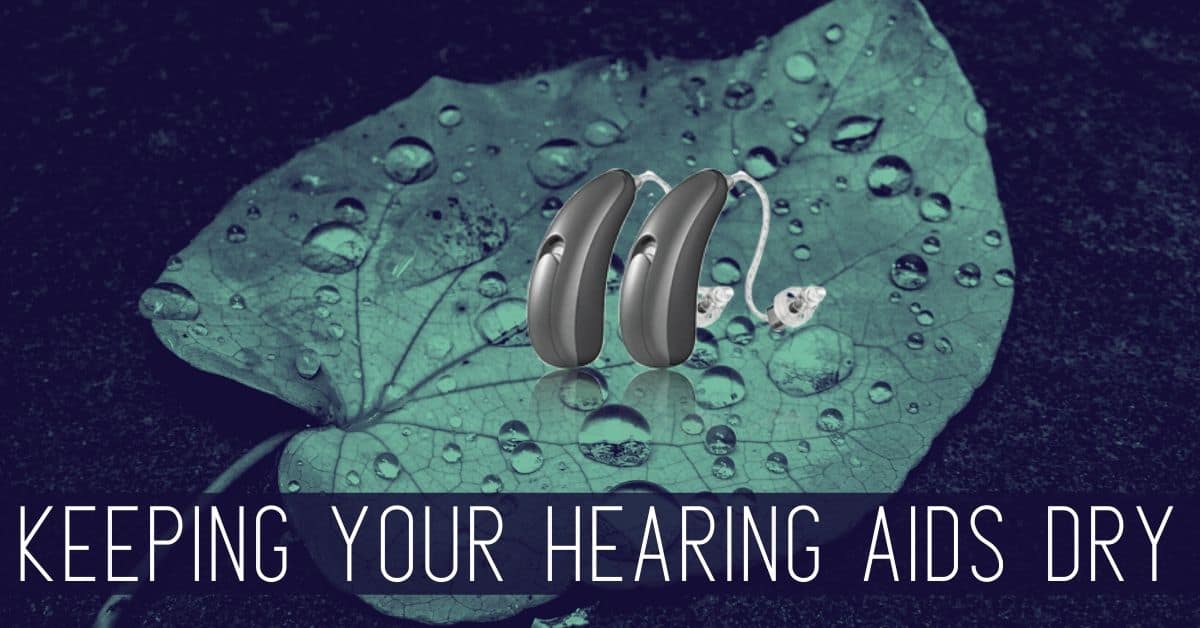
- Common Misconceptions That Delay Hearing Loss Diagnosis - June 6, 2025
- Signs Your Earwax Buildup Needs Professional Attention - May 29, 2025
- Preparing for a Hearing Test and What You Should Bring - May 16, 2025
We all know that water and fragile electronics don’t mix. This could not be truer for hearing aids. You’ve made a big investment in your hearing when you started using your new hearing aids. It’s important to understand how to care for them so you can use them for a long time. No matter how careful we are mistakes are bound to happen, especially with a device like a hearing aid that you take with you everywhere.
Water resistant not Waterproof
Most hearing aids in today’s market are moisture-proof, meaning sweating from a hard workout or walking outside on a rainy day won’t damage your hearing aids. However, the majority of hearing aids are not totally waterproof, and it’s important that you be conscious of your hearing aids in wet environment! Water can be a damaging force to hearing aids, but getting them wet doesn’t always mean you have to start shopping for new ones!
Don’t Panic!
It’s important to remember that just like our phones, hearing aids can be dried out, repaired, and replaced. While we all try to avoid unnecessary purchases, it’s not the end of the world if your hearing aids get wet. Often stress that comes with an accident like getting your hearing aids wet can cause us to stress, which can lead to even more mistakes and disaster. Simply stay calm, and try to dry out your hearing aids the best you can. Don’t assume they’re ruined and do your best to alleviate the damage. If you act quickly, you might be able to solve the problem with no harm done.
How to Dry Out Hearing Aids
The first step after your hearing aids get wet is to turn them off and remove the batteries. Keeping a wet hearing aid battery inside can further damage the device. It’s best to be on the safe side and throw out the batteries, as well. After removing the batteries, you have a few options:
- If you were in dirty or salty water, like the ocean, rinse your hearing aids first with clean water before drying
- Leave your hearing aids on dry newspaper and let them air-dry inside your house for at least 24 hours
- Putting the hearing aids near a table lamp can also speed up the drying process—but do not put them very close to a light bulb or other heat source because this can damage the device
- Take a cup of uncooked rice or silica gel and place in a plastic baggie or a container with a lid. Stick your hearing aid in the rice or silica gel, seal the baggie/container closed, and leave it overnight—silica gel and rice can work as dehumidifiers and soak up the water in your hearing aid
- Dry your hearing aids using a fan, dehumidifier
Accessories for Hearing Aid Maintenance
Many accessories and tools are available for hard-of-hearing users who wish to maintain their hearing aids. If you frequently encounter wetness or moisture, a dehumidifier might be a good investment. Hearing aid dryers and dehumidifiers are relatively inexpensive and offer reliable drying options. Some of these models will even sterilize your hearing aids during the process, so they’ll be clean and dry when you take them out. Other cleaning tools include:
- Cleaning brush: These soft, miniature brushes allow you to polish the accessible interiors of your hearing aids without having to bring them to a hearing care professional Wax pick or wire loop: Accumulated earwax reduces the performance of your hearing aids by blocking sound from entering the ear and could damage the interior electrical parts if not removed. A wax pick or wire loop allows you to eliminate these deposits at home
- Multifunctional stylus: A combination of a brush and wire loop, these pen-sized tools can help you cut down on cleaning time.
- Vent cleaner: Designed for in-the-ear hearing aids, this thin rod can be inserted into the open vent running along the side of your hearing aid.
Your hearing care professional will show you how to use these tools to clean and protect your hearing aids during your fitting. To find out more, contact us at Hearing Aid Specialists of the Central Coast. We can help you make sure your investment in hearing last for years to come.
